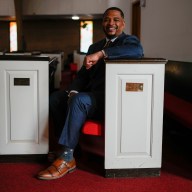 John Hawkes plays one of Elmore Leonard’s career criminals in “Life of Crime.”
John Hawkes plays one of Elmore Leonard’s career criminals in “Life of Crime.”
Credit: Getty Images
For years John Hawkes was one of those “oh, it’s THAT guy” guys, popping up in brief but memorable roles in “From Dusk Till Dawn,” “Rush Hour” and “Blue Streak.” Then he wound up on “Deadwood,” playing Sol Star. Then he scored key roles in “Winter’s Bone” and “Martha Marcy May Marlene.” Then he took co-lead in “The Sessions.” He’s a fixture of movies now, and in “Life of Crime” — based on Elmore Leonard’s “The Switch” — he plays an ex-con who, with Yasiin Bey, kidnaps a trophy wife (Jennifer Aniston) whose husband (Tim Robbins) won’t pay up.
In Leonard’s novels, the criminals tend to be blue-collar types — just men trying to eke by. Your character definitely fits that description.
He’s not just a criminal. He’s been in the service, he was in the Navy. He is out of prison at this point. But I don’t think he’s just another bad guy; I think he’s misunderstood. He thinks this is his big score. He doesn’t want a life of crime. He wants this to work so he doesn’t have to work in the straight world or the underworld.
At first he seems dangerous then becomes almost decent — to a point obviously. But he’s still scary when we first meet him.
I never want to play the ending. Every character I’ve played is going to end up as one thing. I try to find the truth of the character and let as much of that truth come out in moments. You want to serve the story, so you need to worry about Jennifer early on. So you don’t initially play him as a cuddly nice guy, which in a way he kind of is. I wanted to play against that and let the audience discover who he is along the way.
This is only partly a comedy, and your character is one of the straight men in the film.
I’m comfortable with that. It’s like playing rhythm guitar around people who can play really good lead. There is comedy in my character, but it comes out of his frustration and naivete. Nothing is forced with him.
 John Hawkes looks over his kindappee Jennifer Aniston in “Life of Crime.”
John Hawkes looks over his kindappee Jennifer Aniston in “Life of Crime.”
Barry Wetcher
For a lot of your career you’ve been given psycho roles. Do you find the offers are becoming more diverse, especially after “The Sessions”?
I think so. I’m lucky: over the last 10 years I don’t feel like it’s been that hard to find something good to work on. I realized early on, after moving to Los Angeles and trying to find a career as a film actor, that typecasting is a dirty word. But to me, within “typecasting” is the word “cast.” I always felt if I was able to do a certain type of role well, hopefully directors and producers and casting directors might see me as capable of other things. I’ve always done a wide variety of work on stage in Austin. I was happy to be working and not pounding nails or waiting tables.
Even your psycho characters, though, aren’t stock psychos. Your character in “Martha Marcy May Marlene”…
[Chuckles]
Did I get one of the names wrong?
[Laughs] No, I think you got ’em all.
His evil comes out gradually and subtly.
I was avoiding coming across like a Svengali type, an obviously manipulative puppet master. I wanted him to be as bland as possible. [Laughs] If he were an obvious charlatan it would give Martha’s character less validity. You’d wonder why she fell in with those people. Characters who are described as charismatic make me nervous, because it’s hard to play charismatic. If you’re playing an antagonist in a story, you try to make that person a fully formed and interesting human being.
When you made “The Sessions,” you actually placed a ball on your back to give you the feeling of having your character’s curved spine. Then you said you were having back problems after shooting wrapped. How are you now?
Oh, I’m fine, I’m fine. [Laughs] I’m coming up on 55, so the body begins talking back to you a little bit. I don’t have any issues now. It certainly wasn’t helpful. But it was a worthy cause, I felt. It mentioned in the script his spine was relatively curved, so as an actor you can’t disregard that.
Obligatory “Deadwood” question: The show ended without a proper conclusion, and there’s always been vague talk of a reunion of sorts. Any word at all on that?
I’d be really surprised if it did. There are so many people and who knows what their schedules are like. I would certainly block out time if they asked. It was a dream job. But I don’t know of any concrete plan to make more “Deadwood.”
Follow Matt Prigge on Twitter @mattprigge
















